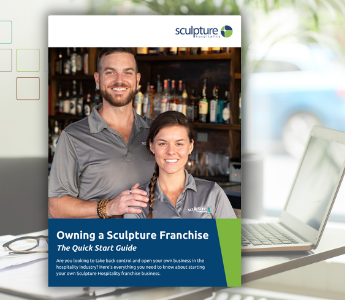So, you're thinking about ditching the 9-to-5 grind and becoming your own boss? Franchising might just be the ticket.
Franchising can be a great way to break free from the corporate world and enjoy the freedom and rewards of entrepreneurship without the same level of risk of starting your own business. But if you’ve never started a franchise before, you probably have no idea where to start.
Well, you’re in luck! In this guide, we’re going to walk through the 10 critical steps you need to take to start your very own franchise business. Before we dive into that, however, let’s first take a look at what franchising actually is and why you should do it.
What is a Franchise?
A franchise is a type of business arrangement where a franchisor grants a license to a franchisee to use its brand, products, and operating systems. In essence, you're buying a proven business model and leveraging the franchisor's brand recognition and support - but you still get to be your own boss.
Why Start a Franchise?
There are many reasons why franchising is an attractive option for entrepreneurs, including:
- Reduced risk: Franchises often have established brand recognition and proven business models, reducing the risk of failure.
- Training and support: Franchisors typically provide comprehensive training and support to help you succeed.
- Brand recognition: You can benefit from the established reputation and customer base of the franchise brand.
- Proven systems: Leverage the franchisor's tried-and-true operating systems and procedures.
- Networking opportunities: Connect with other franchisees and learn from their experiences.
- Work-life balance: Franchising can offer more flexibility and control over your work-life balance compared to traditional employment.
- Financial rewards: Franchises often have the potential for higher earnings compared to traditional employment.
For more information and to find out if this is the right decision for you, check out our blog - Checklist: Are You Ready to Own a Hospitality Franchise?.
Since you’re reading this article, you probably already know what franchising is and why it's a lifestyle that would suit you. So, let’s cut to the chase and look at how you can go about starting your very own franchise.
How to Start a Franchise in 10 Steps
Just like opening any business, starting a franchise involves a defined process and comprehensive plan to ensure a seamless and successful launch. To help you do that, we’ve listed 10 important steps to keep in mind.
Step 1: Research and Choose a Shortlist of Franchises
Your journey should begin by researching different franchise opportunities. You’ll want to consider factors such as industry trends, market demand, your personal interests, and the initial investment required.
It’s important to look for franchises that align with your values, goals and lifestyle. Remember, starting a franchise is about you regaining control of your life, being your own boss and determining your own schedule. It’s still work, but it should be something you’re truly passionate about and enjoy each day.
Step 2: Evaluate the Financial Requirements
Once you’ve created a shortlist of franchise opportunities, it’s time to dig deeper into the financial side of things. Fun, right? Assess the financial requirements for the franchise, including initial fees, ongoing royalties, and the cost of setting up and operating the business. Before making a decision on a franchise you’ll want to make sure you have access to the necessary capital or financing, whether that be paying it yourself or getting a loan.
Here are a few key financial considerations to keep in mind:
- Franchise Fee: This is the upfront payment to the franchisor for the right to use their brand and system.
- Royalties: Ongoing fees paid to the franchisor based on a percentage of sales.
- Initial Investment: Estimate the total cost of setting up the franchise, including equipment, inventory, and operating expenses.
- Financing options: Explore different financing options, such as loans, lines of credit, or investors.
To find some of the best franchise opportunities with a lower initial investment, check out our blog - What are the Best Franchises to Own Under 50k?.
Step 3: Understand the Franchise Agreement
Now you’ve made your final choice, it’s time to carefully review the franchise disclosure document (FDD) and franchise agreement. These documents outline the terms and conditions of your franchise relationship, including your rights, obligations, and fees.
Important information to look out for in the document include:
- The terms of the agreement (how long it lasts, renewal options, termination clauses and territory rights)
- Financial obligations (fees, royalties, and other financial requirements)
- Support services provided by the franchisor (training, marketing, operations assistance)
- Restrictions and limitations
Step 4: Consult With an Experienced Lawyer
Now look, you can definitely review this document on your own (and you should) but opening a franchise is serious business. It’s always a smart idea to hire a franchise attorney to review the franchise agreement and FDD. They can help you understand the legal implications, negotiate terms, and protect your interests in the long-term.
Step 5: Build Your Business Plan
As you move closer to starting your franchise, a business plan will become increasingly important to ensure you’re on the right path to profitability. You’ll want to build a comprehensive business plan that outlines your goals, strategies, and financial projections.
Your business plan should include:
- Executive summary: A concise overview of your business plan.
- Company description: Provide details about your business, including its mission, vision, and target market.
- Market analysis: Conduct a thorough analysis of the market, competition, and trends.
- Operations plan: Outline your operational strategies, including staffing, inventory management, and marketing.
- Financial projections: Develop detailed financial projections, including income statements, balance sheets, and cash flow statements.
Step 6: Secure Funding (if Required)
If you don't have the necessary funds, you will need to seek financing options. This could include loans, investors, or other sources of capital. Ensure you have enough funds to cover the franchise fee, setup costs, and initial operating expenses.
Step 7: Choose Your Franchise Location
The location of your franchise can significantly impact your business's success. Consider factors such as demographics, competition, accessibility, and zoning regulations when selecting a location. It’s also especially important to make sure the franchise you choose works for your lifestyle, family and personal ambitions.
When choosing your location, think about the demographics of that area, the market competition (if any), as well as any regulations that may apply to your business. ‘
Step 8: Complete Your Franchise Training
You’re almost there, exciting! Not that you’ve pretty much started your franchise, it’s time to get going with some training. Most franchisors provide comprehensive training programs for new franchisees. This training will cover operational procedures, marketing, and management practices specific to the franchise. Make sure to attend all required training sessions and take advantage of any additional resources offered by the franchisor.
Step 9: It’s Time to Set up Operations!
With your training done, begin setting up your business according to the franchisor's guidelines. This includes things like purchasing equipment, hiring staff, and implementing the franchise's operational systems. Ensure that everything is in place before your grand opening.
Step 10: Launch and Market Your Franchise
You’re so close, now all you have to do is open your business. You don’t want to do this quietly. This is your chance to make a splash and start gaining some early traction with your potential customers. This could be anything from planning a grand opening event to utilizing marketing and promotional materials from the franchisor to announce your opening.
Are you interested in learning more about franchising or the opportunities available with Sculpture Hospitality? Contact us today and find out whether a Sculpture franchise could be the right fit for you.










